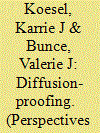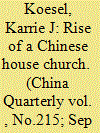|
|
|
Sort Order |
|
|
|
Items / Page
|
|
|
|
|
|
|
| Srl | Item |
| 1 |
ID:
127118


|
|
|
|
|
| Publication |
2013.
|
| Summary/Abstract |
Do authoritarian leaders take preemptive actions to deter their citizens from joining cross-national waves of popular mobilizations against authoritarian rulers? Are they more likely to engage in such behavior when these uprisings appear to be more threatening-in particular, when they take place in neighboring countries and in regimes that resemble their own? We provide answers to these questions by comparing the responses of the Russian and Chinese leadership to two such waves: the color revolutions and the Arab uprisings. We conclude that, despite differences in the ostensible threats posed by these two waves, they nonetheless prompted the leaders of both of these countries to introduce similar preemptive measures in order to "diffusion-proof" their rule from the color revolutions and the Arab upheavals. These findings have some important implications for our understanding of authoritarian politics and diffusion processes. One is to reinforce the emphasis in many recent studies on the strategic foundations of authoritarian resilience. That recognized, however, we would add that the authoritarian toolkit needs to be expanded to include policies that preempt international, as well as domestic threats. The other is to provide further confirmation, in this case derived from the behavior of authoritarian rulers, of how scholars have understood the drivers of cross-national diffusion. At the same time, however, we counsel students of diffusion to pay more attention to the role of resisters, as well as to adopters. In this sense, the geographical reach of diffusion is much broader than many analysts have recognized.
|
|
|
|
|
|
|
|
|
|
|
|
|
|
|
|
| 2 |
ID:
155596


|
|
|
|
|
| Summary/Abstract |
What is the nature of religion and state relations in authoritarian regimes? How do religious and regime actors negotiate the terms of their relationship;what do the two sides want from one another; and how cooperative or conflictual are their interactions? To address these questions, the author compares religion-regime relations in contemporary Russia and China—two autocracies with long histories of religious repression, diverse religious profiles, and distinct relations between religion and the state. The article introduces a new theoretical framework anchored in interests and subnational authoritarian politics to explain how religious and political authorities negotiate their relationship and the constraints and opportunities that shape their interaction. Although there are many reasons to expect different types of religion-regime relations across Russia and China, the data demonstrate that subnational governments and diverse religious actors often forge innovative partnerships to govern more efficiently, gain access to resources, and safeguard their survival.
|
|
|
|
|
|
|
|
|
|
|
|
|
|
|
|
| 3 |
ID:
124641


|
|
|
|
|
| Publication |
2013.
|
| Summary/Abstract |
This article investigates the similarities between the organizational innovation of one underground Protestant house church in China and the rise of early communist parties. Much like the spread of communism, the organizational tactics of the church are designed to protect it in a hostile political environment. The different levels are insulated from each other, with limited knowledge of the members above and below. In this way, if anyone is raided by the authorities, the others can continue to function with little interruption. Thus, the highly touted "organizational weapon" developed by the Bolsheviks and recycled, for example, by the Chinese Communist Party in their struggle for power, has resurfaced many years later. However, this time it has been adopted by a religious "vanguard."
|
|
|
|
|
|
|
|
|
|
|
|
|
|
|
|
|
|
|
|
|